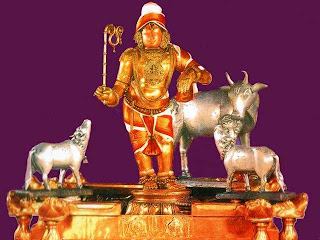he entire conmtent of this mail is from Swami Adidevananda's translation of Ramanujas Gita Bhashya, published by Ramakrishna Mission.
Translations of other slokas of the Gita are available on my blog http://haricharanam.blogspot.
Transform karma into karma yoga - 38-41
1 Gita Sloka every day - Chapter 2 - Samkhya Yoga - Sloka 41
Vyavasayatmika buddhih ekeha kuru nandana I
Bahusaka hy anantascha buddhayo vyavasayinam II sloka 41
व्यवसायात्मिका बुद्धिः एकेह कुरु नन्दन ।
बहुसक हि अनन्तस्च बुद्दयो व्यवसयिनं ।। श्लोक ४१
In this (Karma Yoga), O Arjuna, the resolute mind is one-pointed; the minds of the irresolute are many branched and endless.
Here, ie in every ritual sanctioned by the scriptures, the Buddhi or disposition of mind marked by resolution, is single. The Buddhi marked by resolution is the Buddhi concerned with acts which must be performed by one desirous of release ( and not any kind of work). The term 'Vyavasaya' means unshakeable conviction; this Buddhi (disposition of mind) comes out of prior determination about the true nature of self. But the Buddhi concerning the performance of rituals to fulfil certain desires, is marked by irresolution; because here only this much knowledge of the self is sufficient - 'the self (as an entity) exists differently from the body.' Such a general understanding is sufficient to qualify for performing acts giving fulfillment of certain desires. It does not require any definite knowledge about thetrue nature of self. For, even if there is no such knowledge, desires of heaven etc., can arise, the means for their attainment can be adopted, and the experience of those fruits can take place. For this reason there is no contradiction in teaching of the scriptures. [The contradiction negated here is how the same scriptural acts produce different results - fulfillment of desires and liberation. The difference in the disposition of the mind accounts for it]
The Buddhi (mental disposition) marked by the resolution has a single aim, because it relates to the attainment of a single fruit. For, as far as one desiring release is concerned, all acts are enjoined only for the accomplishment of that single fruit. Therefore, since the purpose of the scriptures here is one only (ie liberation), the Buddhi regarding all rituals taught in the scriptures too is only one, as far as liveration seekers are concerned. For example, the set of 6 sacrifices, beginning with Agneya with all their subsidiary processes (though enjoyed in different passages) forms the subject of a single injunction, as they are all for the attainment of a single fruit. Consequently, the Buddhi concerning these is one only. The meaning of the verse under discussion, must be constructed in the same manner. But the Buddhi of the irresolute ones who are engaged in rituals for winning such fruits as heaven, sons, cattle, food, etc., are endless, fruits being endless. In rituals like darsapurnamasa (new moon and full moon sacrifice), even though attainment of a single fruit (heaven) is enjoyed, there accrues to these the character of having many branches on account of the mention of many secondary fruits as evidenced by such passages as, 'he desires a long life'. Therefore the Buddhi of irresolute ones has many branches and are endless.
The purport is : In performing obligatory and occasional rituals, all fruits, primary and secondary, promised in the scriptures, should be abandoned, with the idea that release or salvation is the only purpose of all scripture ordained rituals. These rituals should be performed without any thought of selfish gains. In addition, acts motivated by desires (kamya karmas) also should be performed according to one's own capacity, after abandoning all desire fro fruits and with the conviction that they also, when performed in that way, form the means for attainment of release. They should be looked upon as equal to obligatory and occasional rites suited to one's own station and stage in life.

No comments:
Post a Comment